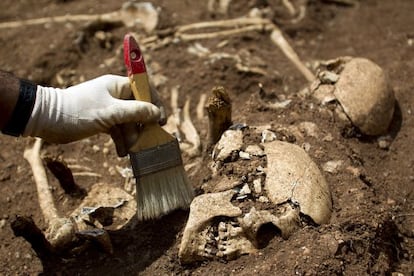Foundation releases video to boost search efforts for Franco victims
Recording release coincides with planned arrival of special United Nations commission to investigate Spain's disappeared


A human rights foundation headed by former crusading Judge Baltasar Garzón has released a video to raise public awareness about the victims who disappeared under the Franco regime following the Spanish Civil War (1936-1939).
The four-minute video shows the work that goes into opening a mass grave from the Franco era: the exhumation, the lab work, the forensic experts' report on the cause of death, and the return of the remains to their families.
Several celebrities have contributed to the project. The journalist Iñaki Gabilondo notes that the Franco regime left behind "more than 150,000 enforced disappearances and more than 30,000 stolen children," while another reporter, Mamen Mendizábal, says that out of 2,232 documented graves, only 390 have been opened so far. "The families have the right to know what happened, how and when," the poet Luis García Montero tells the camera. The writer Almudena Grandes adds that "the right to the truth is a human right."
The last speaker in the video, former Unesco director Federico Mayor Zaragoza, ends with the following line: "A people who do not know their own history cannot plan their future well."
The video release coincides with the announcement by the United Nations that it will send a special committee to Spain between September 23 and 30 to determine whether the conservative government of the Popular Party (PP) is complying with its international obligations to investigate the disappearances.
A people who do not know their own history cannot plan their future"
The goal of this new campaign by the Baltasar Garzón International Foundation is to create sufficient social awareness so that citizens themselves will demand the creation of a truth commission to explore the crimes of the Civil War and subsequent dictatorship, which ended with Franco's death in 1975.
Progress on this front has been so slow in Spain that in April 2010, around 170 people and several associations representing victims filed a suit in Buenos Aires against the crimes committed during the Franco period after being unable, they claimed, to seek justice in Spain.
Baltasar Garzón himself attempted to investigate these crimes when he sat at Spain's central criminal court, but was suspended from his duties in May 2010, on the grounds that he was overstepping his powers. Although he was cleared of the charges in 2012, he was simultaneously charged with two other crimes, one in connection with the Gürtel corruption scheme, which he was also investigating. For this, he was barred for 11 years, in what many people believe was a politically motivated move prompted by his Franco investigation.
After the Argentinean court seeing the Franco case failed to make much progress in the three years since the class action was filed, the pace picked up markedly on Wednesday, when Judge María Servini de Cubría ordered international arrest warrants for four Spaniards accused of torture and abuses during the later years of the Franco dictatorship.
Garzón himself first drew international attention in 1998, when he issued an international arrest warrant against former Chilean dictator Augusto Pinochet. Although Britain refused to extradite Pinochet, the move paved the way for the concept of international justice.
During the official visit of the UN Working Group on Enforced or Involuntary Disappearances to Spain, experts will meet with authorities from the central and regional governments in Madrid, Barcelona, Seville and Vitoria, as well as with relatives of missing persons, associations, lawyers and scholars. In 2014 the committee will turn over its final report to the UN Human Rights Council.







































